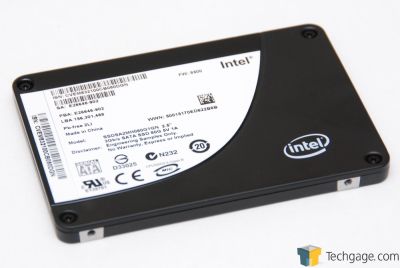- Qualcomm Launches Snapdragon 4 Gen 2 Mobile Platform
- AMD Launches Ryzen PRO 7000 Series Mobile & Desktop Platform
- Intel Launches Sleek Single-Slot Arc Pro A60 Workstation Graphics Card
- NVIDIA Announces Latest Ada Lovelace Additions: GeForce RTX 4060 Ti & RTX 4060
- Maxon Redshift With AMD Radeon GPU Rendering Support Now Available
Intel Issues X25-M Firmware Update, Upgrades Algorithms
Over the course of the past year or so, Solid State Disk solutions have been praised up and down for their ultimate speed, reliability, form-factor and more. Of all the SSDs on the market, one model to hog a lot of attention was Intel’s own X25-M, and for good reason. When launched, it offered incredible speeds not yet seen before (which have now been exceeded by other vendors), and where SSD storage is concerned, that happens to be fairly important.
But, the mood was damped when a report made a few months ago at PC Perspective was published, where the editor noticed that the performance from his personal drive degraded over time, and the benchmarks proved it. The blame for this issue was assumed to reside with the algorithm used, and since fragmentation actually occurred on a sub-block level, typical software defraggers didn’t improve the situation, but rather made things even worse.
Intel followed up days after the originating article was published, and denied that they were able to replicate the issue. Well, it seems that didn’t last too long, because last night, Intel shot out an e-mail saying that the issue has been fixed, and that a new firmware update was made available for those interested. When I followed up to make sure that the problem was actually fixed and not simply reduced, I was told, “The issue reported by PCP has been fixed completely”.
To download the fix, you can go here. If you require support for whatever reason, you can refer to the support list here. I’ve flashed the X25-M’s we have here, and it was the simplest firmware update I’ve done in a while. All it takes is you to burn an .ISO image to a CD, boot up and follow the on-screen instructions. Five minutes, and the problem is no more (at least we hope).
So, if a drive is in what previously seemed to be a permanently degraded state (as discussed, we still feel this is highly unlikely for a client PC user), and a user installs the new firmware they will feel an instant improvement for any sequential operations, which will get better in time as the drive cleans itself up further. This firmware will also prevent the user from getting into such a drastic state of fragmentation, and generally help ensure the sequential write performance is as good as it can be at any moment. This change really has no significant impact on random performance.”
| Source: PC Perspective |
Discuss: Comment Thread
|





